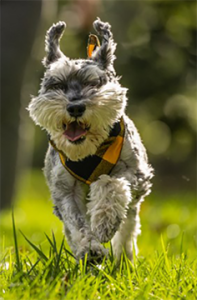COLUMBIA, Mo. — Dog owners from all over the country come to the University of Missouri College of Veterinary Medicine for the high-quality care it provides. The scientific discoveries made by veterinary medicine researchers at Mizzou — a leading research university and member of the Association of American Universities — also help improve the quality of care veterinarians deliver to furry patients around the world.

In honor of National Dog Day on Aug. 26, here are five examples of Mizzou research that’s improving the lives of dogs and their owners:
Mizzou’s Jeffrey Bryan in 2020 helped create a game-changer for canine cancer: a chemotherapy-free alternative to target and kill cancer cells in dogs with bone cancer. The treatment was so successful in dogs that the Food and Drug Administration granted a rare “fast-track designation” for the innovative approach to be used to treat brain cancer in humans.
Just two years later, Bryan became the first to show how “click” chemistry, a new process in which molecules snap together like LEGO bricks, can deliver radiopharmaceuticals more efficiently to the tumors of dogs with bone cancer. Bryan’s research is an example of precision medicine, a type of individualized medical care and a key focus of the NextGen Precision Health initiative.
As it turns out, a dog’s belly and breath are connected. In 2023, Mizzou’s Carol Reinero and Aida Vientos-Plótts studied the interplay between respiratory and digestive systems in dogs. When canines show signs of respiratory disease, such as coughing or difficulty breathing, issues in the upper aerodigestive tract may also lead to swallowing too much air or getting food or water into the lungs. The pair’s research could advance the diagnosis and treatment of both respiratory diseases and digestive system abnormalities.
For people traveling with pets from areas with rabies, such as the U.S. mainland, to places without rabies, pets were historically separated from their owners and required to quarantine in isolation upon arrival for four to six months. Celebrities who often traveled with their pets advocated against these policies, and over time, islands and countries developed less restrictive “pet passport” protocols.
Now, a rabies antibody testing service within Mizzou’s Veterinary Medical Diagnostic Laboratory helps travelers take their pets with them to Hawaii and internationally without the need to quarantine their pet upon arrival.
Ever wonder how service dogs are able to stay so focused? Mizzou Reserve Officers’ Training Corps (ROTC) students will tell you; it’s a lot of hard work. The Mizzou ROTC program collaborated in 2020 with Retrieving Freedom, a Missouri nonprofit organization, to train service dogs and prepare them to help military veterans with post-traumatic stress disorder and other disabilities. The result? A powerful partnership that changes lives.
